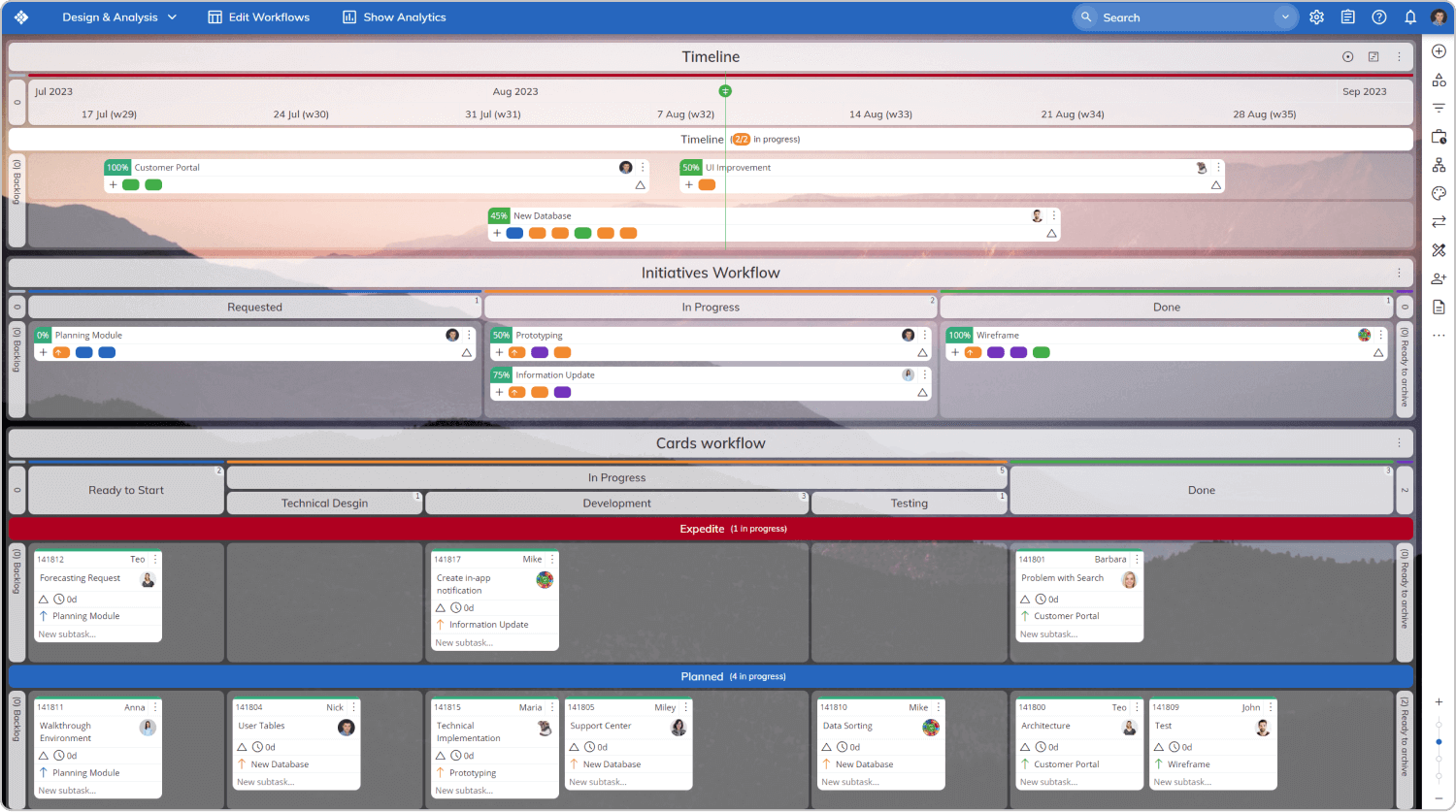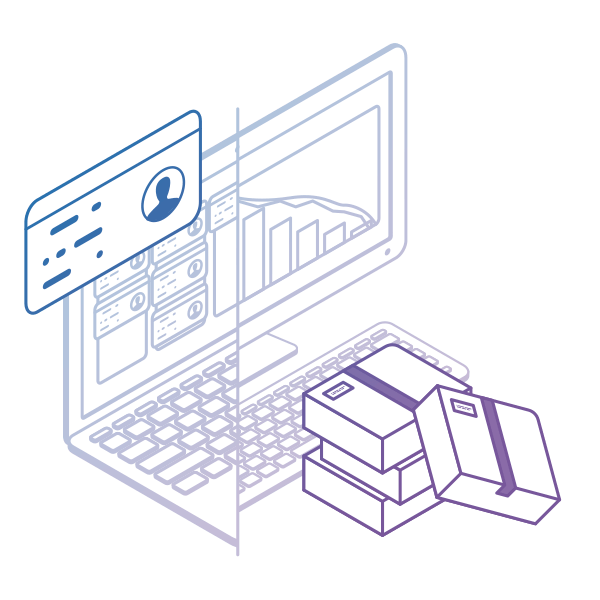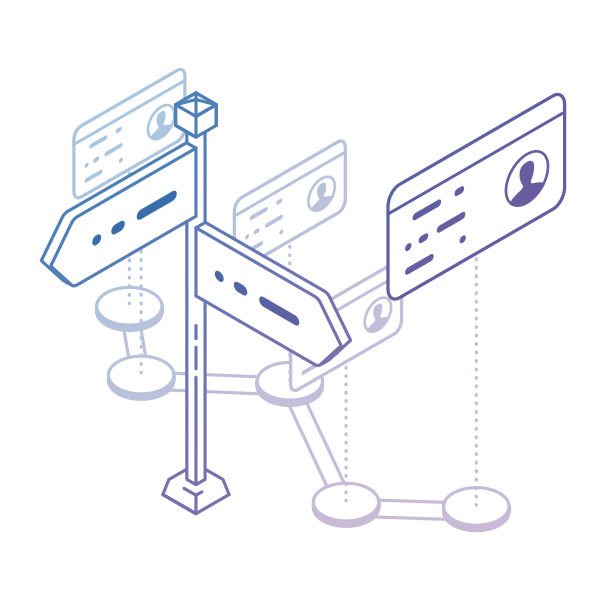The role of technology in shaping the modern product development lifecycle is ultimately undeniable. Modern digital solutions offer a centralized system that brings everyone together around a common purpose, optimizing planning and delivering products faster.
However, the landscape of product management software continues to evolve with new offerings and updates from existing platforms. The selection of software is contingent upon several factors, including the complexity of the project and the specific needs of product management workflows.
It's essential to evaluate each option carefully to determine which one best meets the needs of your organization or team.
What Is a Product Management Tool?
Product management software is an innovative solution that contributes to the success and competitiveness of the products. This digital platform's primary function is to help product managers and product teams streamline and optimize the process of developing, launching, and managing products throughout their lifecycle.
These tools offer a rich set of features and functionalities to support different aspects of product management, including idea generation, prioritization, roadmapping, collaboration, and analytics. Choosing the right software can result in enhanced productivity, effortless communication, and seamless navigation through a portfolio of products aligned with daily operations and business objectives.
Essential Elements of a Worthy Product Management Tool
If one tool works perfectly fine for one team, it doesn’t necessarily mean it will work for another. That’s why there are plenty of solutions to choose from. Despite their differences, consider a set of basic functionalities that a management solution should facilitate when doing your research.
Let’s peer into the list of the key features commonly found in product management tools.
Implementing a product strategy without a clear product roadmap to outline the strategic vision and direction of the product over time poses challenges. Road mapping capabilities ensure visualization and prioritization of planned features, releases, and business objectives. When looking for a solution, ensure it has features supporting this functionality, such as timelines and in-built roadmaps.
- Work management capabilities
Easy daily work management is an essential capability that your tool of choice should facilitate. Capable solutions include task and workflow management features to help teams create, organize, and track the execution of product-related activities, such as feature development, testing, and release management.
Visualizing and tracking cross-functional work dependencies foster visibility across multiple tasks and projects. Establishing a relationship between work items allows teams to understand the activities that impact project completion. Other than that, connecting work items of different organizational levels creates an interconnected structure between high-end business objectives and execution activities, tying together strategy and execution.
Features like comments and in-built messaging systems facilitate communication and collaboration among cross-functional teams, customers, and generally, all stakeholders involved in product development. This functionality keeps everyone informed to make product decisions and improvements.
Given the dynamics in the business environment, your preferred software should support the capability of providing you with real-time updates concerning work changes.
Product management tools may offer built-in analytics and reporting capabilities to track key performance metrics, monitor product usage and adoption, and gain insights into work performance. This data-driven approach helps product managers identify potential risks and make informed decisions using accurate data.
Integration with other systems and platforms creates a shared environment to help streamline workflows and data transfer.
Top 10 Product Management Tools for 2025
While the best and most popular product management software can vary based on your specific needs and preferences, here are some notable options you can evaluate.
1. Businessmap (formerly Kanbanize)
Businessmap is an outcome-driven platform for product portfolio management that provides a holistic solution for enhancing enterprise agility. Designed to accommodate the needs of businesses and teams of all sizes, the software offers a rich set of flexible features, including workspaces, reports, and dashboards to adapt to every team's unique needs.
The software's advanced functionalities allow teams to build highly customizable workflows to plan, visualize, and track progress on multiple larger pieces of work across the organization. Features like traditional kanban boards support daily work management, while the integrated OKR functionality facilitates aligning and monitoring business goals and daily activities.

Other powerful and yet user-friendly features of the Businessmap platform include:
-
Management dashboards: Product managers can monitor business objectives, track key performance metrics, and identify potential risks in a single place.
-
Workflow analytics: It is intuitive to analyze workflow performance through various Lean/ Agile metrics (CFD, cycle time scatterplot, flow efficiency, etc.).
-
Workflow automation: The platform offers a wide variety of automation policies based on the "If-This-Then-That" principle.
-
Integrations: Businessmap offers advanced integration options such as Power BI, Microsoft Teams, Tableau, Google Data Studio, Google Drive, Github, Zapier, etc.
-
Different workflow views: Timelines, Initiatives, and Cards workflows.
"Businessmap is a great tool for Product Development and Management for large organizations."
Associate Product Manager in the Finance industry via Gartner Peer Insights
2. Jira Software
Jira Software, developed by Atlassian, is a commonly used project management and issue-tracking tool that offers robust capabilities for product management. Jira Software provides a platform for software development teams, particularly those following Agile methodologies. It is ideal for managing product backlogs, sprint planning, and tracking software releases.
Key product management features and functionalities:
- High-level product roadmaps to keep everyone aligned
- Customizable workflows to tailor to any scenario
- Workflow management with Scrum and kanban boards
- Pre-build customizable reports and insights
- Built-in workflow automation
- Integration with development and collaboration tools
3. Productboard
Productboard is a customer-centric product roadmap software. It is most suitable for product managers looking to centralize product-related information, prioritize features based on customer feedback, and create transparent roadmaps for stakeholders.
Key product management features and functionalities:
- Product planning with customizable roadmap templates
- Feature prioritization with customized formulas
- Customer feedback management
- Product portal for validating new feature ideas and feedback gathering
- Integration with various collaboration and development tools
- Open APIs
4. Aha!
Aha! is a complete product management software that enables teams to define product strategy, set goals, and create visual roadmaps. It offers features for idea management, strategic planning, and release management.
Key product management features and functionalities:
- Visual roadmap templates with customizable views
- Idea portals for feedback gathering and idea management
- Ideas prioritization page for scoring new feature requests
- Whiteboard templates for brainstorming new product ideas and approaches
- Dashboards and product analytics
5. Asana
Asana is an all-around project management and collaboration tool widely used by product teams. It offers features for task management, team collaboration, and project tracking. Asana is suitable for teams looking for a flexible and intuitive platform for managing product development projects, coordinating cross-functional teams, and tracking project progress.
Key product management features and functionalities:
- Pre-built product-featured templates
- Integrations with hundreds of apps
- Task management with customizable workflows
- Project timelines and visual boards
- Team collaboration with comments, file sharing, and mentions
- Ticketing system for feedback management
- Workflow automation capabilities
6. ProductPlan
ProductPlan is a popular product management tool designed to help product managers and teams create visual roadmaps, prioritize features, and align product strategy with business objectives. It provides a collaborative platform for planning, sharing, and tracking product development initiatives.
Key product management features and functionalities:
- Visual product portfolio roadmaps with different layouts such as Timeline, list, or table view
- Streamlined product workflows
- Importing data from external sources for backlog management
- Integration capabilities with other apps for easy streamlining workflows and enhancing collaboration
- Initiatives priority management
7. аirfocus
airfocus is a strategic product management platform built to help teams align their efforts around clear roadmaps, define product strategy, and focus on what matters most for their customers. Its flexible prioritization framework, visualization capabilities, and integration options make it a preferred solution for organizations seeking to optimize their decision-making processes and drive strategic outcomes.
Key product management features and functionalities:
- Built-in OKRs functionality for strategic alignment and progress tracking
- Customizable roadmaps
- Custom scoring frameworks for defining scoring criteria and weighting factors
- Priority Poker feature that enables teams to collaboratively assign priority scores to items through a group discussion and a voting process
- Customer feedback management
8. Azure Boards
Azure DevOps Boards is a comprehensive Agile project and product management tool, part of the Azure DevOps suite. The platform helps development teams efficiently plan, track, and deliver high-quality software products. Its comprehensive feature set, integration capabilities, and collaboration tools make it a valuable platform for teams looking to adopt Agile practices and accelerate their software development processes.
Key product management features and functionalities:
-
Agile planning through customizable boards, backlogs, and sprints
- Customizable dashboard widgets and analytics tools to gather insights into project progress, team performance, and critical metrics
- Easy workflow management through kanban boards, backlogs, dashboards, and scrum boards
- Comprehensive security and compliance
- Integration with Azure Pipelines, Microsoft's continuous integration and continuous deployment (CI/CD) service
9. ClickUp
ClickUp is a complete project management platform designed to streamline task management, collaboration, and productivity for teams of all sizes. Its user-friendly interface and rich advanced features make it a preferred choice among various teams, including product development. The platform helps teams organize their work, communicate effectively, and track progress in one centralized platform.
Key product management features and functionalities:
- Whiteboards for product planning and brainstorming new ideas
- Roadmapping and overall product management through various custom views (Whiteboards, Mind Maps, Timeline, Gantt chart, List, Table view)
- KPIs and goal-tracking features
- Automated workflows
- Custom dashboards for real-time reporting and progress tracking
- Integration hub with a wide range of third-party tools and service opportunities
10. Monday Dev
Monday.com for Developers is a platform designed to empower developers with the tools and resources they need to build custom applications, integrations, and automation on top of the Monday.com Work Operating System. Equipped with customizable features, the platform helps product teams streamline planning and execution and deliver products faster.
Key product management features and functionalities:
- Multiple views to visualize work (kanban boards, dashboards, Gantt charts and more)
- Roadmaps to plan, visualize, and manage ongoing and future products
- Bug and issue tracking and management
- Gathering feedback for continuous process improvement
- More than a hundred integration opportunities
- Workflows automation
Supporting Tools for Successful Product Management
Besides the product management tools that help product teams oversee the entire product lifecycle, there are also tools from other categories that facilitate this end-to-end process. Let’s briefly review some of them:
-
Survey Monkey is a web-based survey tool aiming to gather customer feedback through questionnaires. The platform helps product teams analyze data collected, share, and present it in various custom graphics.
-
Miro is a virtual whiteboard that helps teams collaborate effectively. Its easy-to-use interface allows teams to brainstorm ideas and create and visualize product roadmaps easily.
-
Figma is a widely used design and prototyping tool that enables teams to create, collaborate on, and iterate designs in a cloud-based environment, streamlining the whole design process from concept to prototype.
-
Slack is a team messaging system uniting teams through instant collaboration, file sharing, and integrations with other tools, thus simplifying communication and workflow coordination.
-
Notion is an all-in-one workspace integrating note-taking, project management, and collaboration tools into one platform. This enables teams to organize information, exchange knowledge, and effectively oversee projects.
Why Is Product Management Software Important for Businesses?
In today's ever-changing business landscape, where business agility and streamlined processes are predominant factors in an organization's success, traditional methods and systems hinder product development, leading to delayed time to market and diminished productivity.
In contrast, modern product management tools provide a centralized platform for managing product-related information, ensuring all team members can access the latest information and reducing the risk of miscommunication. These tools offer enhanced transparency into the progress of product development initiatives.
The automated workflows reduce manual effort, minimize errors, improve overall efficiency in product development processes, and allow teams to focus on value-adding activities.
Moreover, these platforms provide a rich set of analytics, reports, and insights that make it easy for decision-makers to understand and act upon the information presented. They assist product managers in managing work, resources, and portfolios while ensuring continuous alignment with business strategy.
Businessmap is the most flexible software
to align work with company goals
In Summary
Product management software is a much-needed instrument for organizations seeking to speed up their delivery time and efficiently plan and manage their product development process while ensuring second-to-none customer satisfaction.
Choosing the right tool for your team or organization may be an overwhelming task, so we help you by highlighting the top 10 most promising tools you can choose from:
- Businessmap
- Jira Software
- Productboard
- Aha!
- Asana
- ProductPlan
- airfocus
- Azure Boards
- ClickUp
- Monday Dev









